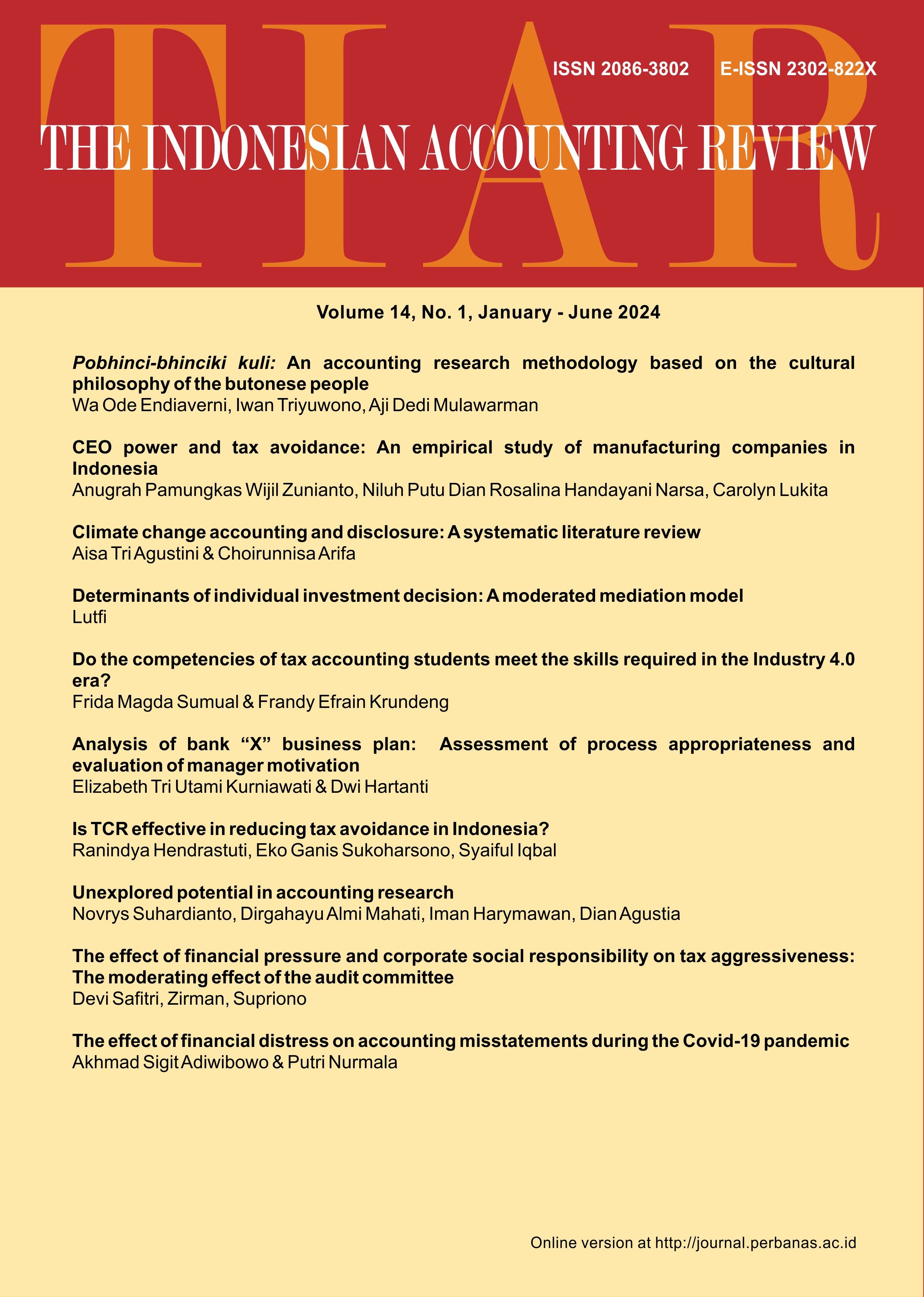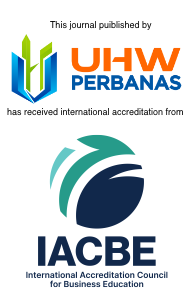CEO power and tax avoidance: An empirical study of manufacturing companies in Indonesia
DOI:
https://doi.org/10.14414/tiar.v14i1.3700Keywords:
CEO power, Cash effective tax rate, Effective tax rateAbstract
This study aims to empirically examines the relationship between CEO power and tax avoidance. The lack of consistent empirical evidence regarding the relationship between CEO power and tax avoidance strategies encourages a deeper investigation into the mechanisms underlying this relationship. This study examines various aspects of CEO power and their impact on tax avoidance, thereby providing a more detailed under-standing of these complex interactions. The sample used in this study is 301 manufac-turing companies listed on the Indonesia Stock Exchange (IDX) for the period of 2015-2019. The data obtained are analyzed using SPSS version 20 software with multiple linear regression analysis. The results of this study show that expert power and prestige power have a positive relationship with tax avoidance, while ownership power has a negative relationship with tax avoidance. It is expected that this study provide theoretical benefits as a reference and knowledge for further research and practical benefits that are useful for the Directorate General of Taxes to formulate policies to reduce the risk of tax avoidance.
References
Amaefula, C., Austin Okezie, C., & Mejeha, R. (2012). Risk Attitude and Insurance: A Causal Analysis. American Journal of Economics, 2(3), 26–32. https://doi.org/10.5923/j.economics.20120203.01.
Amedu, S., & Dulewicz, V. (2018). The relationship between CEO personal power, CEO competencies, and company performance. Journal of General Management, 43(4), 188–198. https://doi.org/10.1177/0306307018762699.
Astutik, D., & Venusita, L. (2020). The Influence of CEO’s Demographic Characteristics on Tax Aggressiveness in Family Firm. Jurnal Akuntansi Dan Keuangan, 22(1), 1–9. https://doi.org/10.9744/jak.22.1.1-9.
Beber, A., & Fabbri, D. (2012). Who times the foreign exchange market? Corporate speculation and CEO characteristics. Journal of Corporate Finance, 18(5), 1065–1087. https://doi.org/10.9744/jak.22.1.1-9
Berger, A. N., Kick, T., & Schaeck, K. (2014). Executive board composition and bank risk taking. Journal of Corporate Finance, 28, 48–65. https://doi.org/10.1016/j.jcorpfin.2013.11.006.
Chen, D., & Zheng, Y. (2014). CEO Tenure and Risk-Taking. Global Business and Finance Review, 19(1), 1–27. https://doi.org/10.17549/gbfr.2014.19.1.01.
D’Aveni, R. A., & Kesner, I. F. (1993). Top Managerial Prestige, Power and Tender Offer Response: A Study of Elite Social Networks and Target Firm Cooperation during Takeovers. Organization Science, 4(2), 123–151. https://doi.org/10.1287/orsc.4.2.123.
Daily, C. M., & Johnson, J. L. (1997). Sources of CEO power and firm financial performance: A longitudinal assessment. Journal of Management, 23(2), 97–117. https://doi.org/10.1016/S0149-2063(97)90039-8.
Davis, J. H., Schoorman, F. D., & Donaldson, L. (1997). Toward a stewardship theory of management. Business Ethics and Strategy, 22(1), 473–500.
DDTCnews. (2020). Ini Realisasi Pajak 2019 per Sektor Usaha, Manufaktur Terkontraksi. https://news.ddtc.co.id/ini-realisasi-pajak-2019-per-sektor-usaha-manufaktur-terkontraksi-18317.
Dyreng, S. D., Hanlon, M., & Maydew, E. L. (2010). The Effects of Executives on Corporate Tax Avoidance. Accounting Review, 85(4), 1163–1189. https://doi.org/10.2139/ssrn.1158060.
Fang, H., Lee, J. S., Chung, C. P., Lee, Y. H., & Wang, W. H. (2020). Effect of CEO power and board strength on bank performance in China. Journal of Asian Economics, 69. https://doi.org/10.1016/j.asieco.2020.101215.
Faradiza, S. A. (2019). Dampak Strategi Bisnis terhadap Penghindaran Pajak. Journal of Applied Accounting and Taxation, 4(1), 107–116. https://doi.org/10.30871/jaat.v4i1.1199.
Farag, H., & Mallin, C. (2016). The influence of CEO demographic characteristics on corporate risk-taking: evidence from Chinese IPOs. European Journal of Finance, 24(16), 1528–1551. https://doi.org/10.1080/1351847X.2016.11.51454
Fernández-Rodríguez, E., García-Fernández, R., & Martínez-Arias, A. (2019). Influence of ownership structure on the determinants of effective tax rates of Spanish Companies. Sustainability (Switzerland), 11(5). https://doi.org/10.3390/su11051441.
Finkelstein, S. (1992). Power in Top Management Teams: Dimensions, Measurement, and Validation. The Academy of Management Journal, 35(3), 505–538. https://doi.org/10.2307/256485.
Gill, A. S., & Biger, N. (2013). The Impact Of Corporate Governance On Working Capital Management Efficiency Of American Manufacturing Firms. Managerial Finance, 39(2), 116–132. https://doi.org/10.1108/03074351311293981.
Glinkowska, B., & Kaczmarek, B. (2015). Classical and Modern Concepts Of Corporate Governance (Stewardship Theory and Agency Theory). Management, 19(2), 84–93. https://doi.org/10.1515/manment-2015-0017.
Hambrick, D. C., & Mason, P. a. (1984). Upper Echelons: The Organization as a Reflection of Its Top Managers. Management, 9(2), 193–206. https://doi.org/10.2307/258434.
Hanlon, M., & Heitzman, S. (2010). A Review of Tax Research. Journal of Accounting and Economics, 50(2–3), 127–178. https://doi.org/10.1016/j.jacceco.2010.09.002
Hsieh, T. S., Wang, Z., & Demirkan, S. (2018). Overconfidence and tax avoidance: The role of CEO and CFO interaction. Journal of Accounting and Public Policy, 37(3), 241–253. https://doi.org/10.1016/j.jaccpubpol.2018.04.004.
Jacob, F. O. F. (2014). An Empirical Study of Tax Evasion and Tax Avoidance : A Critical Issue in Nigeria Economic Development. Journal of Economics and Sustainable Development, 5(1), 22–27.
James, H. L. (2020). CEO Age and Tax Planning. Review of Financial Economics, 38(2), 275. https://doi.org/10.1002/rfe.1072
Kabir, R., Li, H., & Veld-Merkoulova, Y. (2018). Do Managers Act Opportunistically Towards the End of Their Career?. Journal of International Financial Markets, Institutions and Money, 56, 218–232. https://doi.org/10.1016/j.intfin.2018.01.006.
Kepramareni, P., Yuliastuti, I. A. N., & Suarningsih, N. W. A. (2020). Profitabilitas, Karakter Eksekutif, Kepemilikan Keluarga dan Tax Avoidance Perusahaan. Jurnal Bisnis Terapan, 4(1), 93–106. https://doi.org/10.24123/jbt.v4i1.2789
Laguir, I., & Staglianò, R. (2014). How do powerful CEOs manage corporate tax aggressiveness?. Economics Bulletin, 34(3), 1361–1368.
Lanis, R., & Richardson, G. (2011). The effect of Board of Director Composition on Corporate Tax Aggressiveness. Journal of Accounting and Public Policy, 30(1), 50–70. https://doi.org/10.1016/j.jaccpubpol.2010.09.003.
Larcker, D. F., & Tayan, B. (2012). Is a powerful CEO good or bad for shareholders?. Rock Center for Corporate Governance at Stanford University Closer Look Series: Topics, Issues and Controversies in Corporate Governance and Leadership No. CGRP-28. https://doi.org/10.2139/ssrn.2175191.
Lee, R. J., & Kao, H. S. (2020). The Effect Of Ceo Power On Tax Avoidance: Evidence From Taiwan. Global Journal of Business Research, 14(1), 1–27.
Lewellyn, K. B., & Muller-Kahle, M. I. (2012). CEO Power and Risk Taking: Evidence from the Subprime Lending Industry. Corporate Governance: An International Review, 20(3), 289–307. https://doi.org/10.1111/j.1467-8683.2011.00903.x.
Orens, R., & Reheul, A. M. (2013). Do CEO demographics explain cash holdings in SMEs?. European Management Journal, 31(6), 549–563. https://doi.org/10.1016/j.emj.2013.01.003.
Pratama, B. Y., Narsa, N. P. D. R. H., & Prananjaya, K. P. (2022). Tax Avoidance and the Readability of Financial Statements: Empirical Evidence from Indonesia. The Journal of Asian Finance, Economics and Business, 9(2), 103-112. https://doi.org/10.13106/jafeb.2022.vol9.no2.0103.
Raharjo, E. (2007). Agency Theory Vs Stewardship Theory in the Accounting Perspective. Fokus Ekonomi, 2(1), 37–46. https://doi.org/10.34152/fe.2.1.%25p.
Sebhat, W., & Assfaw, A. M. (2019). Analysis of Tax Compliance and Its Determinants: Evidence from Kaffa, Bench Maji and Sheka Zones Category B Tax Payers, SNNPR, Ethiopia. Journal of Accounting Finance and Auditing Studies (JAFAS), 5(1), 32–58. https://doi.org/10.32602/jafas.2019.2.
Shen, W., & Cannella, A. A. (2002). Revisiting the Performance Consequences of CEO Succession: The Impacts of Successor Type, Postsuccession Senior Executive Turnover, and Departing CEO tenure. Academy of Management Journal, 45(4), 717–733. https://doi.org/10.2307/3069306.
Steijvers, T., & Niskanen, M. (2014). Tax Aggressiveness in Private Family Firms: An Agency Perspective. Journal of Family Business Strategy, 5(4), 347–357. https://doi.org/10.1016/j.jfbs.2014.06.001.
Sudana, I. M., & Aristina, N. P. N. (2017). Chief Executive Officer (Ceo) Power, Ceo Keluarga, dan Nilai Ipo Premium Perusahaan Keluarga Di Indonesia. Jurnal Akuntansi, 21(2), 219. https://doi.org/10.24912/ja.v21i2.196.
Ting, H. I., Chueh, H., & Chang, P. R. (2017). CEO Power And Its Effect On Performance And Governance: Evidence From Chinese Banks. Emerging Markets Review, 33, 42–61. https://doi.org/10.1016/j.ememar.2017.09.005.
Tjahjadi, B., Soewarno, N., & Mustikaningtiyas, F. (2021). Good Corporate Governance and Corporate Sustainability Per-formance in Indonesia: A triple bottom line approach. Heliyon, 7(3), e06453. https://doi.org/10.1016/j.heliyon.2021.e06453.
Wahyuni, L., Fahada, R., & Atmaja, B. (2019). The Effect of Business Strategy, Leverage, Profitability and Sales Growth on Tax Avoidance. Indonesian Management and Accounting Research, 16(2), 66. https://doi.org/10.25105/imar.v16i2.4686.
Wu, S., Quan, X., & Xu, L. (2011). CEO power, disclosure quality and the variability of firm performance: Evidence from China. Nankai Business Review International, 2(1), 79–97. https://doi.org/10.1108/20408741111113510.
Downloads
Submitted
Published
How to Cite
Issue
Section
License
Copyright (c) 2024 The Indonesian Accounting Review

This work is licensed under a Creative Commons Attribution-NonCommercial 4.0 International License.

















